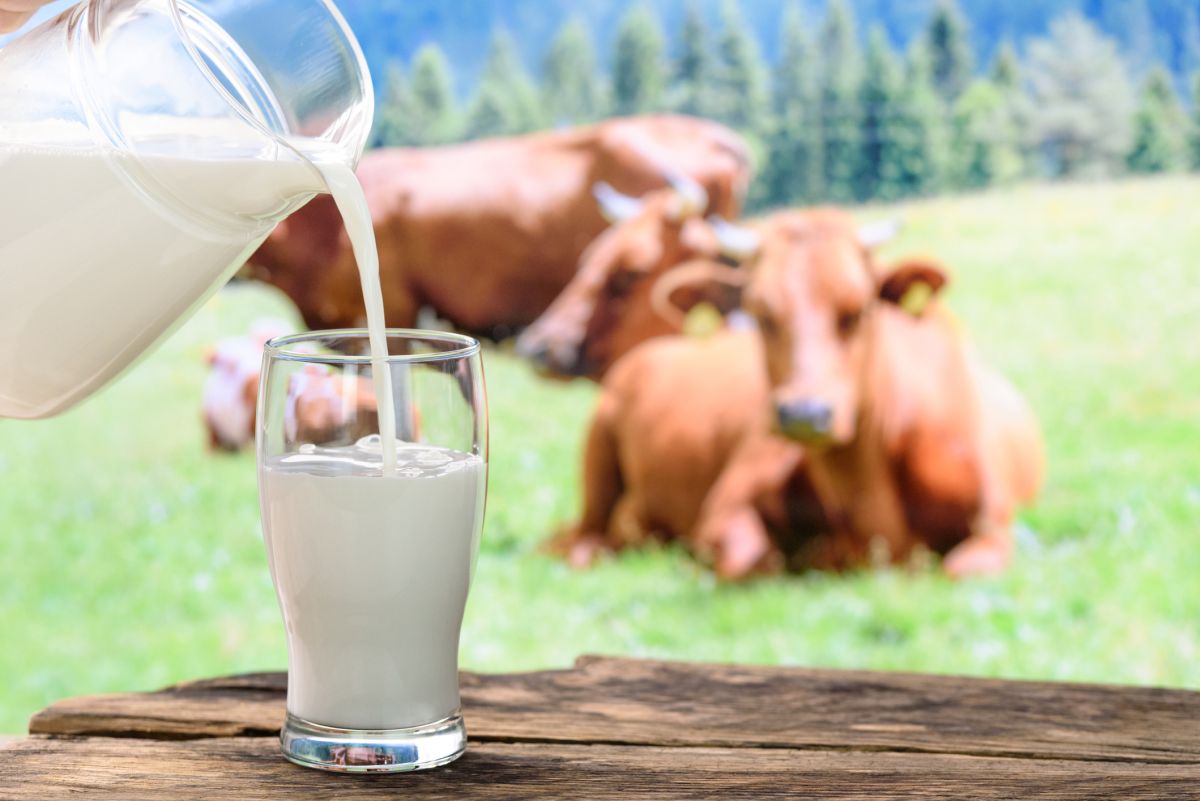When looking at buffalo milk vs. cow milk, there are a few things to consider. The two vary in nutritional value and can be found predominately in different parts of the world.

What is Cow Milk?
Cow milk is produced by the mammary glands of mammals. It is full of different vitamins and minerals that can be beneficial to one’s health.
Health Benefits of Cow Milk
- Cow milk is packed with nutrients so it is an excellent source of vitamins and minerals that our bodies need.
- Cow milk may help reduce the risk of high blood pressure, due to its calcium, magnesium, and potassium contents.
- Drinking milk has been linked to preventing weight gain as it has a variety of components that may contribute to weight loss or prevent weight gain. This only includes whole milk.
- Cow milk may help promote bone health and fight against osteoporosis, which is a condition characterized by a decrease in bone density.
Cow Milk Disadvantages
- If someone has lactose intolerance, they may lose the ability to fully digest milk, and the lactose isn’t fully absorbed. If someone is lactose intolerant, consuming cow milk may lead to symptoms, such as gas, bloating, diarrhea, vomiting, abdominal cramps, and nausea.
- Some adults may have an allergy to milk, but this is more present in children. By consuming cow’s milk, someone with a milk allergy can experience breathing problems, skin rash, swelling, blood in stools, diarrhea, and vomiting.
- Milk consumption has been linked to acne. This is due to the increased levels of insulin-like growth factor-1 from high milk consumption.
Common Uses For Cow Milk
Cow milk is processed into a number of products, such as cheese, kefir, ice cream, cream, and butter. Cow milk is also used to produce casein, condensed milk, powdered milk, whey protein, lactose, and many other industrial products and food additives.
What is Buffalo Milk?
Primarily produced from water buffaloes, buffalo milk is a creamy dairy product. Since buffaloes are mammals, they have mammary glands in order to feed their offspring.
Buffalo Milk Health Benefits
- Buffalo milk may be beneficial to heart health. Some studies have found that fermented buffalo milk can contain Lactis, a kind of bacteria that is helpful for the heart. Consuming buffalo milk may lower triglyceride levels, blood pressure, and cholesterol levels.
- Buffalo milk may be beneficial to weight management. Because buffalo milk may contain the bacteria L.paracasei, this may show anti-obesity effects on body fat. The probiotics found in buffalo milk can help with managing weight as well.
- Buffalo may provide antioxidant activity, as it has vitamins, minerals, and bioactive compounds. Antioxidants fight against compounds that may have harmful effects on your body known as fight free radicals. Fight free radicals have been linked to certain diseases.
- Buffalo milk may support bone health as it has high amounts of calcium, a mineral needed for bone health. This kind of milk is also a source of casein-derived properties that may reduce your risk of osteoporosis and may promote bone health.
Disadvantages of Buffalo Milk
- In general, the disadvantages of drinking buffalo milk are considered to be inconclusive as more research is needed regarding this topic.
- While some believe that buffalo milk may be a suitable allergy substitute, others disagree.
- Some people are allergic to buffalo milk or have lactose intolerance so by consuming buffalo milk, some may experience abdominal pain, bloating gas, and diarrhea
Buffalo Milk Common Uses
Buffalo milk is commonly used for manufacturing traditional, or indigenous Indian, milk products. Since buffalo milk is thicker and creamy, it is more suited to products like khoa, dahi, malai, paneer, kulfi, kheer, payasam, and ghee.
Buffalo Milk vs. Cow Milk: How Are They Similar?
Buffalo milk and cow milk are both highly nutritious, as well as being an excellent source of calcium. Both types of milk also provide a great amount of vitamins and minerals.
Key Differences: Buffalo Milk vs. Cow Milk
Nutritional Value
| Nutrition | Cow Milk | Buffalo Milk |
| Water | 87.8% | 81.8% |
| Protein | 3.2 grams | 4.5 grams |
| Fat | 3.9 grams | 8 grams |
| Carbohydrate | 4.8 grams | 4.9 grams |
| Energy | 66 kilocalories | 110 kilocalories |
| Sugar Lactose | 4.9 grams | 4.9 grams |
| Saturated Fat | 2.4 grams | 4.2 grams |
| Monounsaturated Fat | 1.1 grams | 1.7 grams |
| Polyunsaturated Fat | 0.1 grams | 0.2 grams |
| Cholesterol | 14 milligrams | 8 milligrams |
| Calcium | 120 micrograms | 195 micrograms |
Mineral Content Value
| Minerals | Cow Milk | Buffalo Milk |
| Calcium | 0.12% | 0.18% |
| Phosphorus | 0.10% | 0.14% |
| Magnesium | 0.01% | 0.02% |
| Sodium | 0.05% | 0.04% |
| Potassium | 0.15% | 0.11% |
| Chloride | 0.10% | 0.07% |
| Citrate | 0.18% | 0.18% |
Other Notable Differences Between Buffalo and Cow Milk
| Difference | Buffalo Milk | Cow Milk |
| Who is the milk good for? | Buffalo milk is good for adults. | Cow milk is good for infants, as well as adults. |
| Texture | Buffalo milk is thick and has a grainy texture. | Cow milk is thin and smooth. It doesn’t have a grainy texture. |
| Color | Buffalo milk has a white color. | Cow Milk is a golden-yellowish color. |
| Digestibility | Buffalo milk isn’t easy to digest. | Cow milk is very easy to digest. |
| Amount of calories | Buffalo milk has more calories. | Cow milk has fewer calories. |
| Amount of water | Buffalo milk has less water. | Cow milk has more water. |
| Amount of cholesterol | Buffalo milk has less cholesterol. | Cow milk has more cholesterol. |
| Amount of protein | Buffalo milk has more protein. | Cow milk has less protein. |
| Amount of carbohydrates | Buffalo milk has slightly more carbohydrates. | Cow milk has slightly fewer carbohydrates. |
| Fats | Buffalo milk has more saturated fatty acid, monounsaturated fatty acid, and polyunsaturated fatty acid. | Cow milk has less saturated fatty acid, monounsaturated fatty acid, and polyunsaturated fatty acid. |
| Minerals | Buffalo milk has greater amounts of calcium, iron, phosphorous, and more. | Cow Milk has less calcium, iron, phosphorous, and more. |
| Vitamins | Buffalo milk has more Vitamin A. | Cow Milk has more Vitamin E, but less Vitamin A. |
| Sulfur | Buffalo milk has less sulfur. | Cow milk has more sulfur, which is considered good for an active brain. |
| Top producers | The top three producers of buffalo milk include China, India, and Pakistan. | The top three producers of view milk include Ireland, Finland, and Sweden. |
| Preservation | Buffalo milk can be preserved for a longer time. | Cow milk cannot be preserved for a long period of time. |
| Liters | A good and healthy buffalo can provide 10 liters of milk per day. | A good and healthy cow can provide 20 liters of milk per day. |
| Weight | Buffalo milk is good for weight gain. | Cow milk is good for weight loss. |
| Nutritional value | Buffalo milk has less chloride, sodium, and potassium. | Cow milk has more chloride, sodium, and potassium. |
| Is it good for you? | Buffalo milk is good for people who deal with eczema, psoriasis, lactose intolerance, or irritable bowel syndrome. | Cow milk isn’t good for people who deal with eczema, psoriasis, lactose intolerance, or irritable bowel syndrome. |
Which is the Healthier Choice: Buffalo Milk vs. Cow Milk
Neither buffalo milk nor cow milk is considered healthier than the other. There is no major nutritional difference when you compare buffalo milk and cow milk. Both are rich in nutrients and can give your body the nutrients it needs.
If you want milk that is easier to digest, cow milk is best. However, if you are looking to keep yourself satisfied for a longer period of time, buffalo milk could be the best option for you. When choosing between the two, you should consider what your body requires, as well as which one you prefer.

Leave a Reply